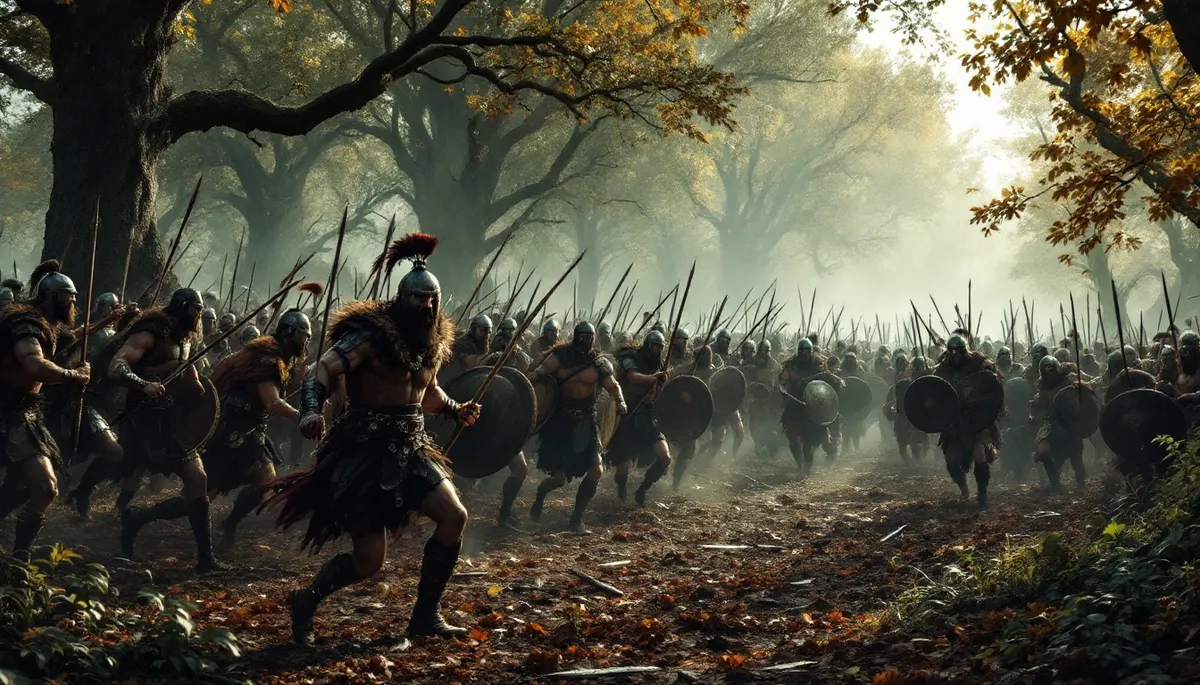The Battle of Teutoburg Forest

The Battle of Teutoburg Forest stands as a pivotal moment in ancient history. Here, three Roman legions met their demise at the hands of Germanic tribes led by Arminius.
The forest’s dense terrain played a critical role, allowing the tribes to execute ambush tactics effectively.
This defeat not only shattered Roman confidence but also catalyzed a stronger sense of unity among the Germanic tribes. The implications of this battle would echo far beyond its immediate aftermath.
What transformations did this defeat inspire within the Roman Empire?
TL;DR
Hide- Arminius, a former Roman ally, orchestrated a rebellion, unifying Germanic tribes against the overconfident Roman governor Varus.
- The dense terrain of Teutoburg Forest favored local tribes, hindering Roman legions' mobility and facilitating ambush tactics.
- Initial Roman confidence quickly turned to chaos as formations broke down due to confusion and panic in the challenging landscape.
- Harsh weather conditions further exacerbated the disarray, contributing to the psychological collapse of Roman troops during the battle.
- The catastrophic defeat resulted in the loss of three entire legions, significantly altering the balance of power between Rome and the Germanic tribes.
The Historical Context of The Battle of Teutoburg Forest: Tension on the Roman Frontier
The tensions on the Roman frontier reached a boiling point as Arminius, a cunning Germanic strategist, plotted against the legions commanded by Varus.
This clash of cultures highlighted not only the vulnerabilities of Roman military might but also the resilience of the tribes intent on resisting domination.
The impending conflict in Teutoburg Forest would serve as a critical juncture in the struggle for power along the borders of the Empire.
Arminius the Germanic Strategist
Arminius emerged from a complex background, shaped by both his Germanic roots and his formative years in the Roman military, which equipped him with insight into the empire’s strategies.
This duality fueled his clandestine ambitions to unify the disparate Germanic tribes against a common enemy, exploiting the growing tensions along the Roman frontier.
His strategic acumen would soon transform him from a Roman ally into a formidable adversary, challenging the very foundations of Roman dominance in the region.
Early Life and Roman Military Experience
A remarkable figure emerged from the turbulent landscapes of Germania, where the Roman Empire‘s expansion met fierce resistance.
Arminius, born into a noble family, was raised in Roman culture, gaining military experience as an auxiliary officer.
This unique background shaped his perspective, enabling him to navigate the complexities of loyalty and identity, ultimately igniting a revolutionary spirit against the oppressive Roman forces encroaching upon his homeland.
Secret Plans to Unify the Tribes
Tensions simmered along the Roman frontier as Arminius, now a master strategist, devised secret plans to unify the disparate Germanic tribes against their common enemy.
Recognizing the strength in numbers, he sought to transcend tribal rivalries, igniting a fierce spirit of resistance.
This unprecedented alliance aimed not just for survival, but for liberation from Roman subjugation, a bold demonstration of their yearning for freedom.
Varus and the Roman Legions
Governor Varus exemplified a leadership style marked by both ambition and an unsettling overconfidence, believing that Roman dominance in the northern territories was unassailable.
This hubris not only alienated local tribes but also blinded him to the brewing discontent among the very people he sought to control.
As tensions escalated, Varus’s miscalculations would set the stage for a catastrophic confrontation that would redefine Rome’s imperial ambitions in Germania.
The Roman Governor’s Leadership Style
Leadership in times of strife is often marked by the ability to navigate complex challenges, and this was particularly evident in the case of Publius Quinctilius Varus during the tumultuous period leading up to the Battle of Teutoburg Forest.
His approach, characterized by a blend of authority and perceived weakness, ultimately alienated local tribes, sowing the seeds of rebellion against Roman dominance.
Overconfidence in Northern Territories
The Roman Empire’s expansion into the northern territories was marked by an air of overconfidence, particularly evident in the strategies employed by Varus and his legions.
This hubris blinded them to the fierce autonomy of the Germanic tribes, underestimating their resolve and tactical ingenuity.
Such arrogance not only destabilized the frontier but ultimately led to a catastrophic downfall, igniting a fierce struggle for freedom.
The Setting: Teutoburg Forest’s Geographic Advantage
The Teutoburg Forest, with its dense woodlands and narrow passes, provided a formidable backdrop for the Germanic tribes’ strategic maneuvers.
This natural landscape not only hindered the Roman legions’ mobility but also facilitated ambush tactics that played to the defenders’ strengths.
In such a setting, the geographic advantages became a critical factor in the unfolding conflict, challenging Roman assumptions of dominance.
Dense Woodlands and Narrow Passes
The dense woodlands and narrow passes of Teutoburg Forest created a formidable barrier for the heavy Roman formations, limiting their ability to maneuver effectively.
This challenging terrain favored the local tribes, who possessed intimate knowledge of hidden paths that the invaders could not exploit.
As a result, the geographic advantage played a vital role in the unfolding of the conflict, shaping the strategies of both sides.
Difficult Terrain for Heavy Roman Formations
Dense woodlands and narrow passes defined the landscape of Teutoburg Forest, creating formidable obstacles for the heavy formations of the Roman legions.
The dense foliage hindered visibility and mobility, rendering traditional Roman tactics ineffective. As the legions struggled to maneuver, they became vulnerable targets, illustrating how terrain can decisively influence the outcome of battle, especially against a resourceful opponent utilizing their environment to its fullest advantage.
Hidden Paths Known Only to Locals
Hidden paths, known only to the local tribes, played a pivotal role in the dynamics of the Teutoburg Forest.
These concealed routes allowed the Germanic warriors to maneuver swiftly, outflanking and ambushing the heavy Roman legions.
This intimate knowledge of the terrain not only provided tactical advantages but also underscored the significance of local wisdom in the struggle for autonomy against an imperial force.
Germanic Preparations and Ambush Tactics
The Germanic tribes capitalized on the forest’s dense terrain to strategically position their warriors, creating a formidable network of ambush points.
This meticulous planning allowed for surprise attacks that shattered the Roman formations, exploiting their reliance on organized tactics.
The battle exemplifies how geographic advantages, combined with astute military acumen, can turn the tide against a seemingly superior force.
Strategic Placement of Warriors
While the terrain of Teutoburg Forest presented a formidable challenge for any invading force, the Germanic tribes capitalized on its natural features to orchestrate a masterful ambush against the Roman legions.
Their warriors were strategically positioned among dense foliage and elevated terrain, allowing for an advantageous surprise.
This calculated placement maximized their effectiveness, turning the very landscape into a weapon against the might of Rome.
Surprise Attacks That Broke the Roman Lines
Utilizing the dense underbrush and steep slopes of Teutoburg Forest, the Germanic tribes meticulously crafted a plan to disrupt the Roman legions‘ advance.
Their surprise attacks, executed with precision, shattered the Roman lines, exploiting the terrain to conceal their movements.
This tactical ingenuity not only overwhelmed the legions but also fortified the resolve of the Germanic warriors, igniting their fervor for freedom.
The Battle Unfolds: A Crushing Defeat for Rome
As the initial clashes erupted in the dense confines of Teutoburg Forest, Roman legions quickly found themselves engulfed in confusion and disarray.
The panic that spread among the ranks marked the beginning of a catastrophic unraveling, leading to a decisive blow that would shatter Rome’s ambitions in Germania.
With heavy losses accumulating, the battle showcased not only the vulnerability of a once-mighty empire but also the fierce resolve of its adversaries.
First Clashes and Rising Panic
As the initial skirmishes erupted in the dense Teutoburg Forest, the Roman legions quickly found their formations disintegrating amidst the chaos.
Panic swept through the ranks, eroding the once-unshakeable morale of the soldiers who had confidently marched into battle.
This catastrophic breakdown not only marked the beginning of their defeat but also exposed the vulnerabilities within the might of Rome.
Formation Breakdown and Chaos
Although the Roman legions initially marched into the Teutoburg Forest with unwavering confidence, the terrain soon conspired against them, leading to a catastrophic breakdown of their formations.
Panic surged as:
- Ambush tactics left the legions disorganized.
- The dense forest obstructed visibility and communication.
- Germanic warriors exploited the chaos, striking swiftly.
This turmoil revealed Rome’s vulnerability, igniting a fierce struggle for survival.
Roman Morale Collapses
Amidst the chaos of the Teutoburg Forest, morale among the Roman legions began to unravel, a psychological collapse that would prove as devastating as the physical onslaught.
As the first clashes erupted, fear rippled through the ranks. Confidence waned, and panic replaced discipline, transforming seasoned soldiers into disoriented fighters.
The specter of defeat loomed large, undermining the very foundation of Roman might.
Final Blow and Heavy Losses
As the battle raged on, the relentless harsh weather compounded the chaos, severely impacting the Roman legions‘ ability to maneuver and fight effectively.
The culmination of these factors led to the devastating loss of three entire legions, marking a catastrophic turning point in Roman military history.
This defeat not only shattered the Roman advance into Germania but also reverberated through the empire, questioning its invincibility.
Harsh Weather Intensifies the Struggle
The relentless downpour and suffocating mud transformed the Teutoburg Forest into an unforgiving battleground, amplifying the chaos that unfolded during the fierce encounter between Roman legions and Germanic tribes.
Key factors included:
- Visibility: Heavy rain obscured sightlines, hindering Roman formations.
- Mobility: Soldiers struggled to maneuver in treacherous conditions.
- Morale: The relentless weather sapped the will to fight, favoring the determined tribes.
The End of Three Legions
Unforgiving weather conditions set the stage for a catastrophic confrontation that would seal the fate of three Roman legions in the Teutoburg Forest.
As the Germanic tribes skillfully exploited the terrain, the legions found themselves ensnared, suffering devastating losses.
The battle’s ferocity shattered Rome’s illusion of invincibility, marking a pivotal moment in history that echoed the struggle for freedom against overwhelming oppression.
Aftermath: Shockwaves Through the Roman Empire
The defeat in Teutoburg Forest sent tremors through the Roman Empire, prompting a stunned reaction from Emperor Augustus, who grappled with the implications for his legacy and authority.
This Germanic victory marked a pivotal shift in power dynamics, as tribes once considered subjugated began to assert their independence and challenge Roman supremacy.
The reverberations of this loss would reshape not only military strategy but also the very perception of Roman invincibility.
Emperor Augustus’ Reaction
In the wake of the catastrophic defeat at Teutoburg Forest, Emperor Augustus uttered the haunting plea, “Varus, give me back my legions,” capturing the depth of his despair and the gravity of the loss.
This battle not only shattered Rome’s military ambitions in Germania but also instigated significant political repercussions, igniting debates about leadership, accountability, and the empire’s direction.
The shockwaves of this defeat reverberated throughout Rome, challenging the very foundation of Augustus’s rule and prompting an introspection that would alter the course of imperial policy.
Famous Quote: “Varus, Give Me Back My Legions
Echoing through history, the anguished cry of Emperor Augustus—”Varus, give me back my legions”—captures the profound shock and despair that followed the catastrophic defeat in the Teutoburg Forest.
This sentiment reflected:
- The staggering loss of military might.
- The challenge to Roman supremacy.
- The awakening of Germanic independence.
Augustus’ lament illustrated the deep rift in Roman confidence and the urgent need for reevaluation.
Political Repercussions in Rome
Augustus’ anguished cry resonated far beyond the confines of personal grief, marking a pivotal moment in Roman political dynamics.
The catastrophic loss in Teutoburg Forest incited fear and uncertainty, undermining imperial authority. Augustus faced mounting pressure to fortify borders and reassess military strategies, leading to a more cautious approach to expansion.
This seismic event compelled Rome to reconsider its ambitions and the cost of empire.
Germanic Victory and Shifting Power
The Germanic victory at Teutoburg Forest catalyzed a remarkable unification of disparate tribes, transforming them into a formidable collective that challenged Roman hegemony.
This newfound regional dominance not only shifted the balance of power in Northern Europe but also cast a long shadow over Roman expansionist ambitions.
The implications of this defeat reverberated throughout the empire, prompting a reevaluation of military strategy and territorial policy.
Unification of Tribes and Regional Dominance
Although the Battle of Teutoburg Forest marked a significant military defeat for Rome, its repercussions extended far beyond the battlefield, catalyzing a profound unification of Germanic tribes.
This newfound solidarity resulted in:
- Increased cooperation among tribes against Roman incursions.
- The emergence of charismatic leaders rallying warriors.
- A strengthened cultural identity, fostering resilience and resistance.
Such dynamics reshaped regional power, challenging Roman dominance.
The Lasting Impact on Roman Expansion
While the echoes of the Germanic victory at Teutoburg Forest reverberated through the Roman Empire, the implications for Roman expansion were profound and far-reaching.
This defeat shattered the myth of Roman invincibility, catalyzing a reevaluation of imperial ambitions. Tribes gained confidence, alliances formed, and the Roman frontier solidified, marking a pivotal shift in power dynamics and ultimately redefining the trajectory of European history.
Why This Battle Still Resonates
The Battle of Teutoburg Forest continues to resonate due to its profound implications for military strategy and the enduring lessons it offers to modern warfare.
Additionally, its cultural legacy is reflected in how societies commemorate this pivotal moment, shaping national identities and narratives.
Military Tactics and Strategic Lessons
The Battle of Teutoburg Forest serves as a profound case study in the critical impact of terrain and the element of surprise in military strategy.
The decisive leadership of Arminius, who exploited the Romans’ overconfidence, underscores how effective command can alter the course of history.
Analyzing these factors reveals enduring lessons in the complexities of warfare that continue to resonate in modern military thought.
Importance of Terrain and Surprise
Although often overshadowed by more famous battles, the significance of terrain and the element of surprise in the Battle of Teutoburg Forest offers invaluable lessons for military strategy.
Key takeaways include:
- Familiarity with the Environment: Knowledge of local geography can turn the tide.
- Psychological Warfare: Surprise disrupts enemy morale.
- Adaptability: Flexible tactics exploit weaknesses effectively.
These insights remain relevant for modern military operations.
How Leadership Shaped Outcomes
While terrain and surprise were critical factors in the outcome of the Battle of Teutoburg Forest, the role of leadership emerged as a defining element that shaped the course of events.
Arminius, a master strategist, galvanized disparate tribes, uniting them against a common foe. His cunning and adaptability contrasted sharply with the rigid Roman command structure, showcasing how effective leadership can alter the fate of nations.
Cultural Legacy and Modern Commemorations
The Battle of Teutoburg Forest continues to shape Germany’s cultural landscape, as memorials and historical sites draw attention to its enduring significance.
Contemporary historians engage in robust debates over its implications, reflecting on how this ancient confrontation resonates within modern identity and nationalism.
As a pivotal moment in history, it raises questions about memory, legacy, and the narratives that societies choose to uphold.
Memorials and Historical Sites in Germany
As the echoes of the Battle of Teutoburg Forest continue to resonate through history, the memorials and historical sites scattered across Germany serve as poignant reminders of this pivotal event.
Notable sites include:
- The Kalkriese Museum, where artifacts reveal the battle’s intricacies.
- The Hermannsdenkmal, a towering monument honoring Germanic resistance.
- The Teutoburg Forest itself, a living tribute to the clash of cultures.
Ongoing Debates Among Historians
How has the legacy of the Battle of Teutoburg Forest shaped contemporary discussions among historians?
The narratives surrounding this pivotal conflict provoke debates on identity, resistance, and imperialism. Scholars wrestle with interpretations, questioning how this defeat influenced Roman strategies and Germanic nationalism.
As modern commemorations arise, they reflect evolving perspectives on freedom, power, and cultural memory, ensuring the battle’s relevance endures in historical discourse.
Wrapping Up
The Battle of Teutoburg Forest stands as a pivotal point in history, illustrating the perilous pitfalls of overreach and complacency in conquest.
This calamitous clash catalyzed a cohesive coalition among the Germanic tribes, crystallizing their collective resistance against Roman domination.
The reverberations of this defeat not only reshaped the trajectory of the Roman Empire but also served as a stark reminder of the strengths found in local knowledge and unity.
Consequently, history’s lessons linger, urging vigilance against vanity.



